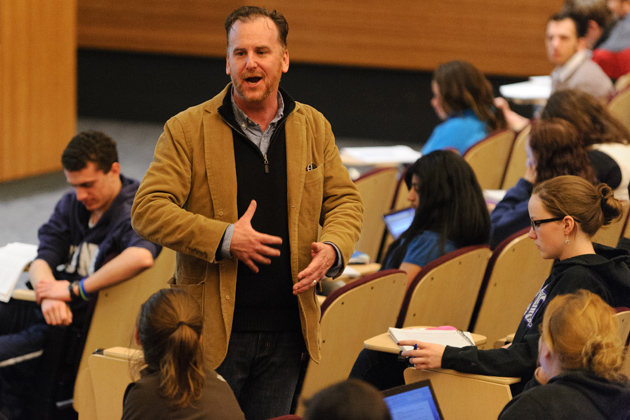University President Susan Herbst is a guest contributor to UConn Today. Her posts generally appear on Wednesdays.
On March 23, the Washington Post ran an op-ed by David Levy, a former chancellor at the New School University, asking: “Do college professors work hard enough?” He suggests that faculty at non-research institutions don’t put in enough hours for the pay they receive. Not surprisingly, this created a small firestorm among faculty nationwide, who weren’t shy about telling him what they thought.
I have held faculty and administrative positions only at research institutions – where the mission is both teaching and research – so I wouldn’t presume to speak for faculty at schools focused exclusively on teaching. Yet there are some across-the-board myths about academic life in general, and professors sometimes seem to be a target.
This likely has to do with the fact that unless someone has been a professor or graduate student or worked with them, they probably don’t fully understand what professors do. Instead, presumptions are made about an alleged leisurely life spent in an ivory tower sitting around in tweed coats, smoking pipes, and discussing Kant or Rawls (which actually doesn’t sound bad, except for the pipe smoke). That scene may happen, but it doesn’t reflect how faculty spend most of their time.
So perhaps the best question isn’t, “Do college professors work hard enough?” Instead, it might be, “What do professors do, anyway?”
For professors, actual time spent teaching in the classroom is the tip of the iceberg that follows a great deal of preparation: sifting through mountains of books and articles to pick the texts for students to read; creating detailed course plans; producing voluminous notes and presentations for every class and writing a syllabus, among other things. Professors don’t just stroll into class and say what’s on their mind.
Professors can have 20, 30, 40, to 300 students in a class or lecture and they often require individual attention for myriad reasons: help understanding the course material, to discuss their approach to a paper or why they received a particular grade, among many others. This isn’t confined to the set office hours most faculty hold. The advent of email changed the way many students and faculty interact, so many professors are always on duty in this respect.
Advising students and grading their work takes significant time, as does campus life – oh, the committees. Many professors devote a good deal of their time to various other assignments: search committees to hire colleagues or administrators, tenure review committees, curriculum committees, Ph.D. committees; and a host of task forces and working groups formed to address all the challenges your average college and university can encounter. This takes countless hours, but must be done and is often beneficial for the institution. They must also engage in professional development on a regular basis, to ensure they are at the forefront of their discipline.
At research universities, like UConn, teaching undergraduate courses and graduate seminars is similar to one’s “day job,” in that it represents only part of what faculty must do. In addition to that, they must also conduct research, whether it’s in a laboratory, a library, or a site halfway across the world. Faculty produce research to contribute to their respective field in meaningful ways in addition to their bedrock mission of educating students. Research is what leads to things like curing illnesses, historical revelation, greater economic development, and better informing the decisions and practices of governments, interest groups, and businesses, to name just a few.
And most professors don’t spend their breaks lounging; they often use the time to work.
Faculty are so vital that, in fact, UConn recently enacted a plan to hire 300 new professors over the next four years. And it isn’t because faculty lounges are dangerously empty. It’s because along with our students, the quality of a university’s faculty directly correlates to the quality of a university – both in terms of teaching and research. They not only teach our students and contribute powerfully to our state, they also contribute to the lifeblood of innovation and progress in scores of fields that impact all of our lives.
Does that mean there’s no such thing as unproductive faculty members? No, of course not. There are – they exist in every profession. But in my experience in the academic world, they are the exception, not the rule.
This column was first published in The Huffington Post on April 4, 2012.




